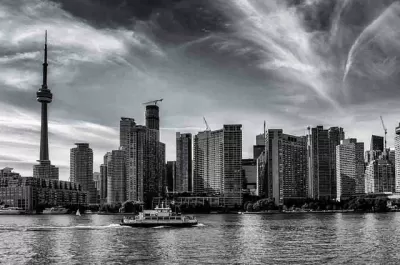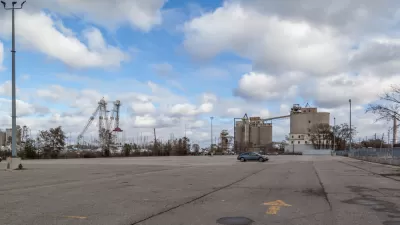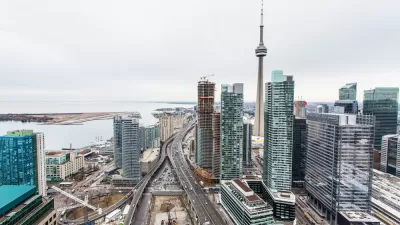Sidewalk Labs' proposals for the Toronto neighborhood of Quayside reveals a preference for ride hailing over public transit.

Paris Marx has read the response to the Request for Proposals for a high-profile "smart city" project in the Toronto neighborhood of Quayside, and what he found will not be welcome among transit advocates.
Marx points to page 133 of the proposal, finding a graph that reveals the transportation priorities of Sidewalk Labs. According to Mark, if Sidewalk Labs pursues its vision, "[t]ransit use would only increase by a single percentage point, while automobile use would be reduced to 15 percent by a larger uptake of walking and cycling (35 percent) and the use of driverless vehicles, ride hailing, and car share services (10 percent)."
There are several specific sections of the proposal that Marx reads as giving priority to ride hailing and driverless vehicles—even potentially over pedestrians and cyclists. The proposals calls for "non-hierarchical streets," for instance, would abandon the complete streets layout that most benefits alternative transportation, according to Marx. The most troubling section of the report, to Marx, is the call for shared ride zones, "where Quayside residents would get subsidized shared-ride trips instead of taking transit."
The article does highlight some portions of the proposal that provide more positives for alternative transportation modes and technological advancements that could potentially benefit every mode but eh automobile. The proposal would extend transit lines to better connect Quayside to the rest of the city's transit infrastructure. Marx is also careful to note the small scale of the project—the neighborhood only covers 12 acres, but Sidewalk Labs does have larger plans to parlay its work in Quayside to the entire East Waterfront neighborhood.
FULL STORY: Sidewalk Toronto Puts Ride Hailing Before Public Transit

Alabama: Trump Terminates Settlements for Black Communities Harmed By Raw Sewage
Trump deemed the landmark civil rights agreement “illegal DEI and environmental justice policy.”

Study: Maui’s Plan to Convert Vacation Rentals to Long-Term Housing Could Cause Nearly $1 Billion Economic Loss
The plan would reduce visitor accommodation by 25% resulting in 1,900 jobs lost.

Planetizen Federal Action Tracker
A weekly monitor of how Trump’s orders and actions are impacting planners and planning in America.

Federal Homelessness Agency Places Entire Staff on Leave
The U.S. Interagency Council on Homelessness is the only federal agency dedicated to preventing and ending homelessness.

Restoring Northern India’s Himalayan ‘Water Temples’
Thousands of centuries-old buildings protect the region’s natural springs and serve as community wells and gathering places.

Milwaukee to Double Bike Share Stations
Bublr Bikes, one of the nation’s most successful, will add 500 new e-bikes to its system.
Urban Design for Planners 1: Software Tools
This six-course series explores essential urban design concepts using open source software and equips planners with the tools they need to participate fully in the urban design process.
Planning for Universal Design
Learn the tools for implementing Universal Design in planning regulations.
Caltrans
Smith Gee Studio
Institute for Housing and Urban Development Studies (IHS)
City of Grandview
Harvard GSD Executive Education
Toledo-Lucas County Plan Commissions
Salt Lake City
NYU Wagner Graduate School of Public Service




























